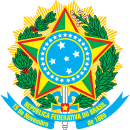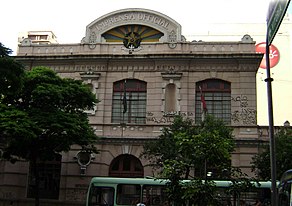| Part of a series on the |
| Culture of Brazil |
|---|
 |
| Society |
| Topics |
| Symbols |

The history of the press in Brazil begins in 1808 with the arrival of the Portuguese royal family in Colonial Brazil, when all forms of press activity were prohibited – including the publication of newspapers, books, or pamphlets. This was a peculiarity of Portuguese America, as press was present in other European colonies on the continent since the 16th century.
With the arrival of the royal family, the Royal Press (now Imprensa Nacional) was founded, where the first Brazilian newspaper, the Gazeta do Rio de Janeiro, was printed.[1] (The Correio Braziliense is older, but it was printed in London.[2]) Even with the press already established in the country, it did not develop rapidly and was primarily limited to government establishments and newspapers. Brazilian newspapers were few in number, and many did not publish regularly. Most newspapers and magazines in circulation were foreign.[3]
Even later, during the Empire (1822–1889), public libraries were rare, except in major cities such as Rio, where the National Library stood out. The country had few bookstores, and books were printed in Europe, making them very expensive.[3]
- ^ "O Brasil agora é reino". Enciclopédia Delta de História do Brasil. Editora Delta S/A. 1969. p. 1596.
- ^ Cite error: The named reference
:1808was invoked but never defined (see the help page). - ^ a b "A evolução cultural do império". Enciclopédia Delta de História do Brasil. Editora Delta S/A. 1969. p. 1737.
